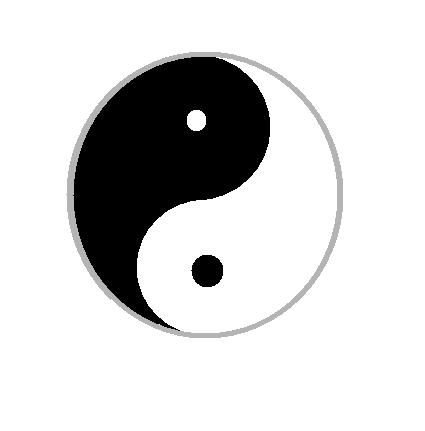Laozi's Dao De Jing 16-20 (老子道德經 16-20) from Administrator's blog

第十六章
致虛極,守靜篤,萬物並作,吾以觀復。夫物芸芸,各復歸其根。歸根曰 靜,靜曰復命。復命曰常,知常曰明。不知常,妄作凶。知常容,容乃公 。公乃王,王乃天,天乃道,道乃久,沒身不殆。
Chapter 16
1. The (state of) vacancy should be brought to the utmost degree, and that of stillness guarded with unwearying vigour. All things alike go through their processes of activity, and (then) we see them return (to their original state). When things (in the vegetable world) have displayed their luxuriant growth, we see each of them return to its root. This returning to their root is what we call the state of stillness; and that stillness may be called a reporting that they have fulfilled their appointed end.
2. The report of that fulfilment is the regular, unchanging rule. To know that unchanging rule is to be intelligent; not to know it leads to wild movements and evil issues. The knowledge of that unchanging rule produces a (grand) capacity and forbearance, and that capacity and forbearance lead to a community (of feeling with all things). From this community of feeling comes a kingliness of character; and he who is king-like goes on to be heaven-like. In that likeness to heaven he possesses the Tao. Possessed of the Tao, he endures long; and to the end of his bodily life, is exempt from all danger of decay.
第十七章
太上,下不知有之﹔其次,親而譽之﹔其次,畏之﹔其次,侮之。信不足 焉,有不信焉。悠兮其貴言。功成事遂,百姓皆謂:「我自然」。
Chapter 17
1. In the highest antiquity, (the people) did not know that there were (their rulers). In the next age they loved them and praised them. In the next they feared them; in the next they despised them. Thus it was that when faith (in the Tao) was deficient (in the rulers) a want of faith in them ensued (in the people).
2. How irresolute did those (earliest rulers) appear, showing (by their reticence) the importance which they set upon their words! Their work was done and their undertakings were successful, while the people all said, 'We are as we are, of ourselves!'
第十八章
大道廢,有仁義﹔智慧出,有大偽﹔六親不和,有孝慈﹔國家昏亂,有忠 臣。
Chapter 18
1. When the Great Tao (Way or Method) ceased to be observed, benevolence and righteousness came into vogue. (Then) appeared wisdom and shrewdness, and there ensued great hypocrisy.
2. When harmony no longer prevailed throughout the six kinships, filial sons found their manifestation; when the states and clans fell into disorder, loyal ministers appeared.
第十九章
絕聖棄智,民利百倍﹔絕仁棄義,民復孝慈﹔絕巧棄利,盜賊無有。此三 者,以為文不足。故令有所屬:見素抱朴,少私寡欲。
Chapter 19
1. If we could renounce our sageness and discard our wisdom, it would be better for the people a hundredfold. If we could renounce our benevolence and discard our righteousness, the people would again become filial and kindly. If we could renounce our artful contrivances and discard our (scheming for) gain, there would be no thieves nor robbers.
2. Those three methods (of government) Thought olden ways in elegance did fail And made these names their want of worth to veil; But simple views, and courses plain and true Would selfish ends and many lusts eschew.
第二十章
絕學無憂。唯之與阿,相去幾何?善之與惡,相去若何?人之所畏,不可 不畏。荒兮其未央哉!眾人熙熙,如享太牢,如登春台。我獨泊兮其未兆 ,如嬰兒之未孩。 兮,若無所歸。眾人皆有餘,而我獨若遺。我愚人 之心也哉!沌沌兮。俗人昭昭,我獨昏昏。俗人察察,我獨悶悶。澹兮其 若海,飉兮若無止。眾人皆有以,我獨頑且鄙。我獨異於人,而貴食母。
Chapter 20
1. When we renounce learning we have no troubles.
The (ready) 'yes,' and (flattering) 'yea;'—
Small is the difference they display.
But mark their issues, good and ill;—
What space the gulf between shall fill?
What all men fear is indeed to be feared; but how wide and without end is the range of questions (asking to be discussed)!
2. The multitude of men look satisfied and pleased; as if enjoying a full banquet, as if mounted on a tower in spring. I alone seem listless and still, my desires having as yet given no indication of their presence. I am like an infant which has not yet smiled. I look dejected and forlorn, as if I had no home to go to. The multitude of men all have enough and to spare. I alone seem to have lost everything. My mind is that of a stupid man; I am in a state of chaos.
Ordinary men look bright and intelligent, while I alone seem to be benighted. They look full of discrimination, while I alone am dull and confused. I seem to be carried about as on the sea, drifting as if I had nowhere to rest. All men have their spheres of action, while I alone seem dull and incapable, like a rude borderer. (Thus) I alone am different from other men, but I value the nursing-mother (the Tao).

The Wall